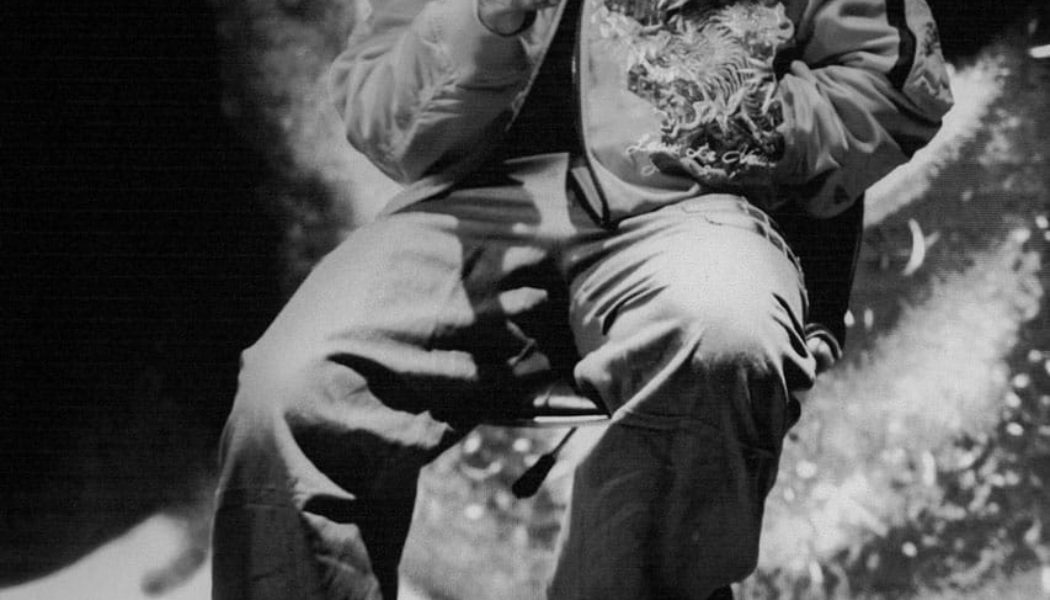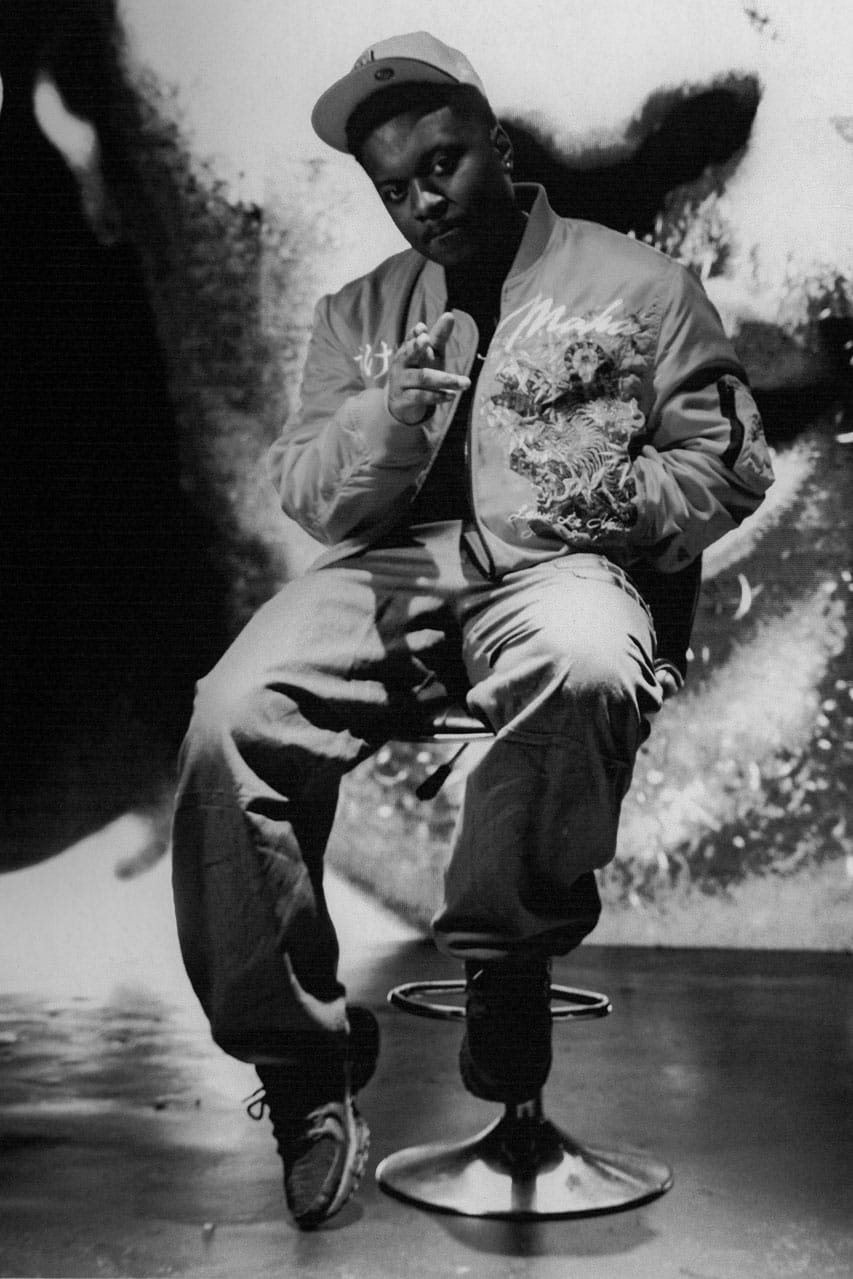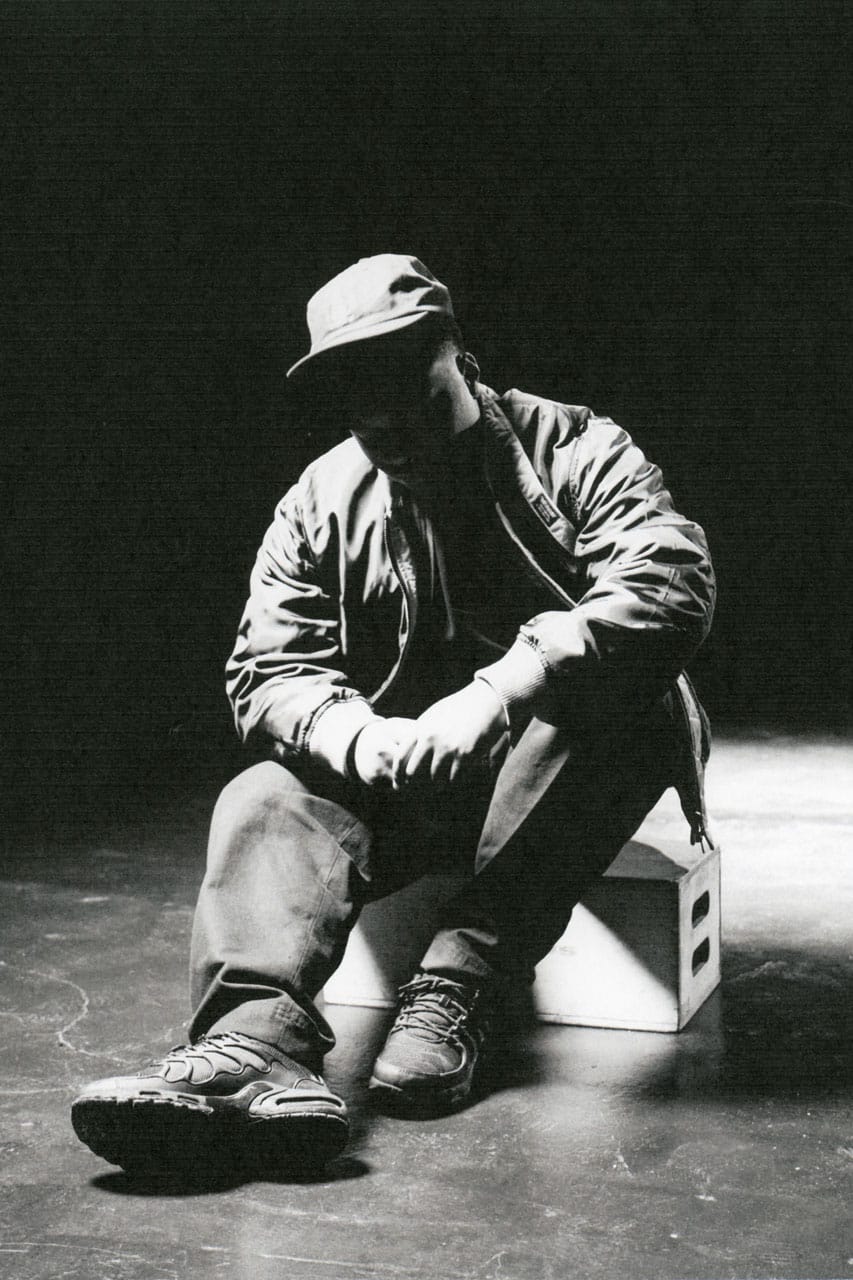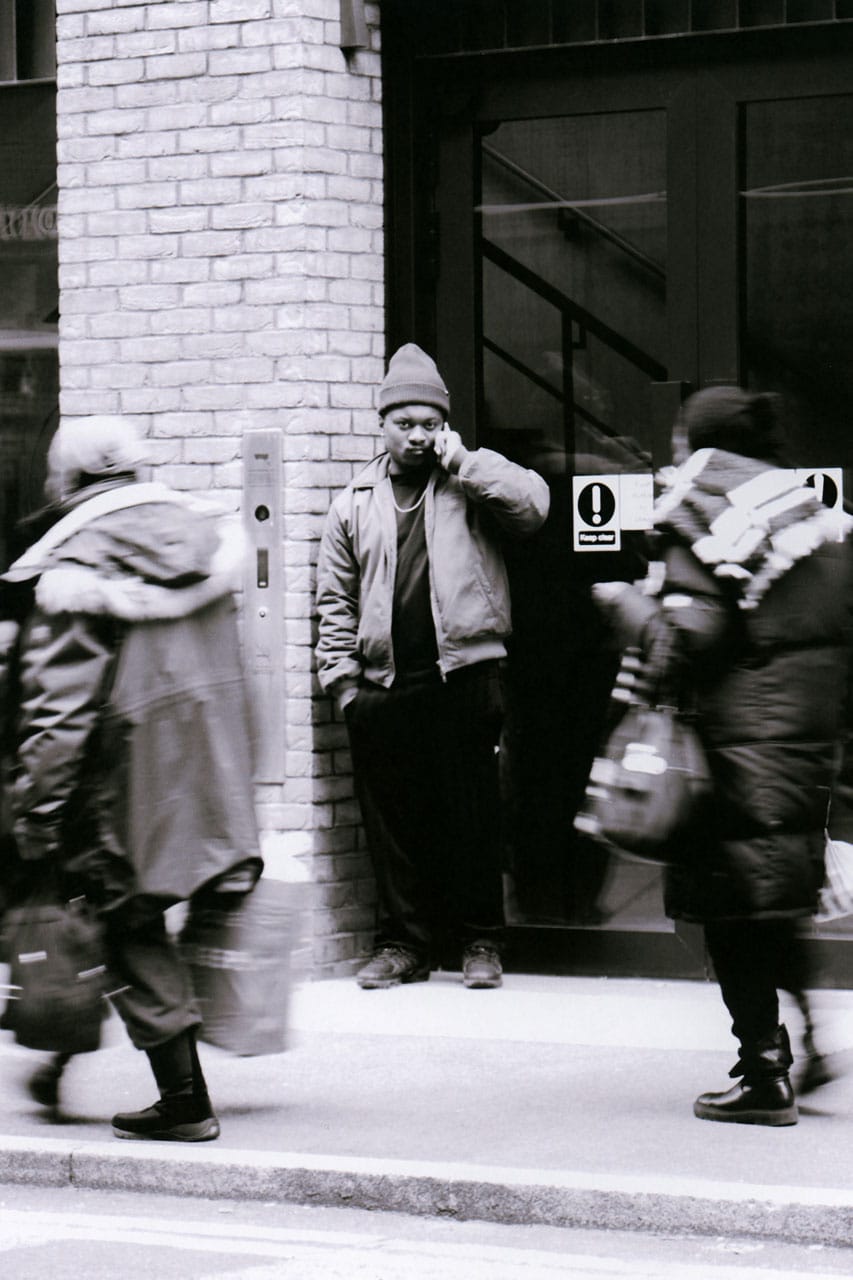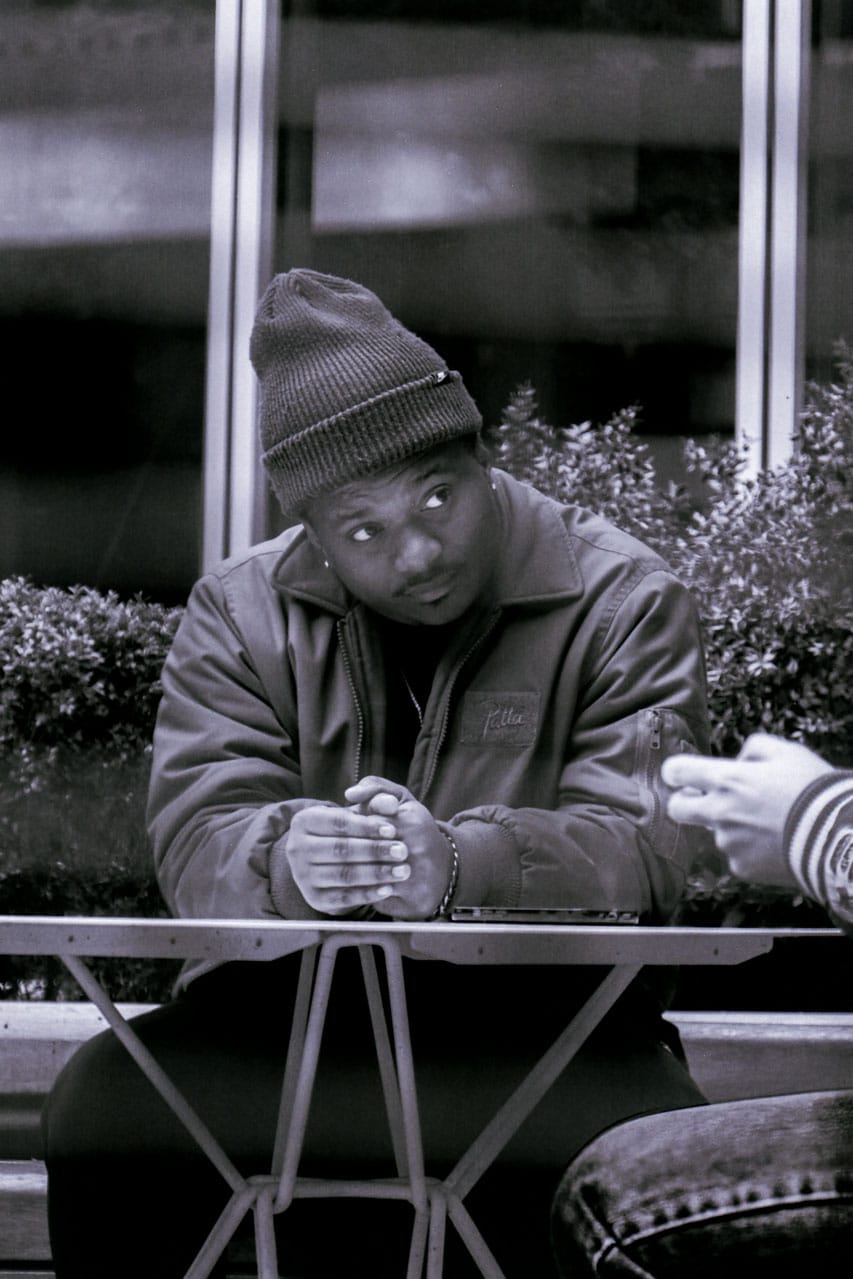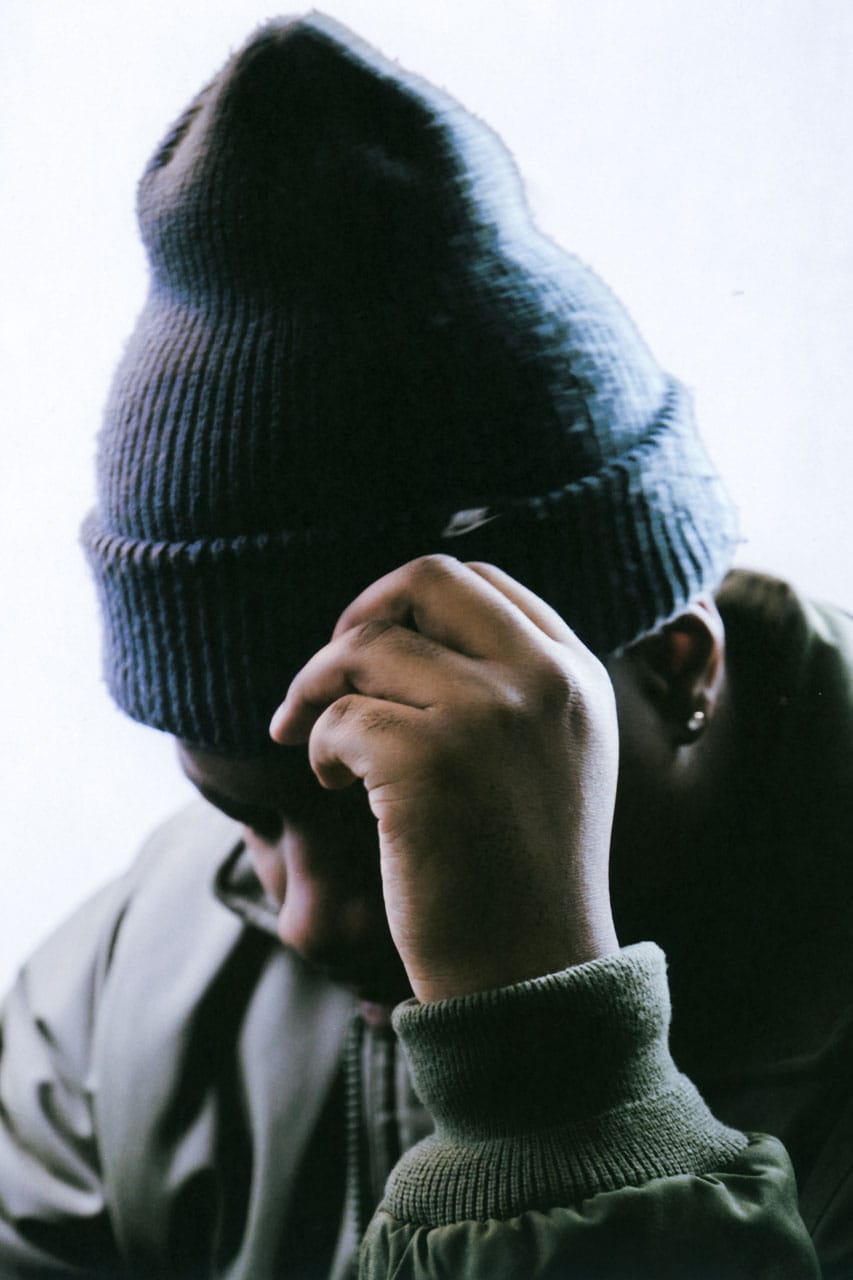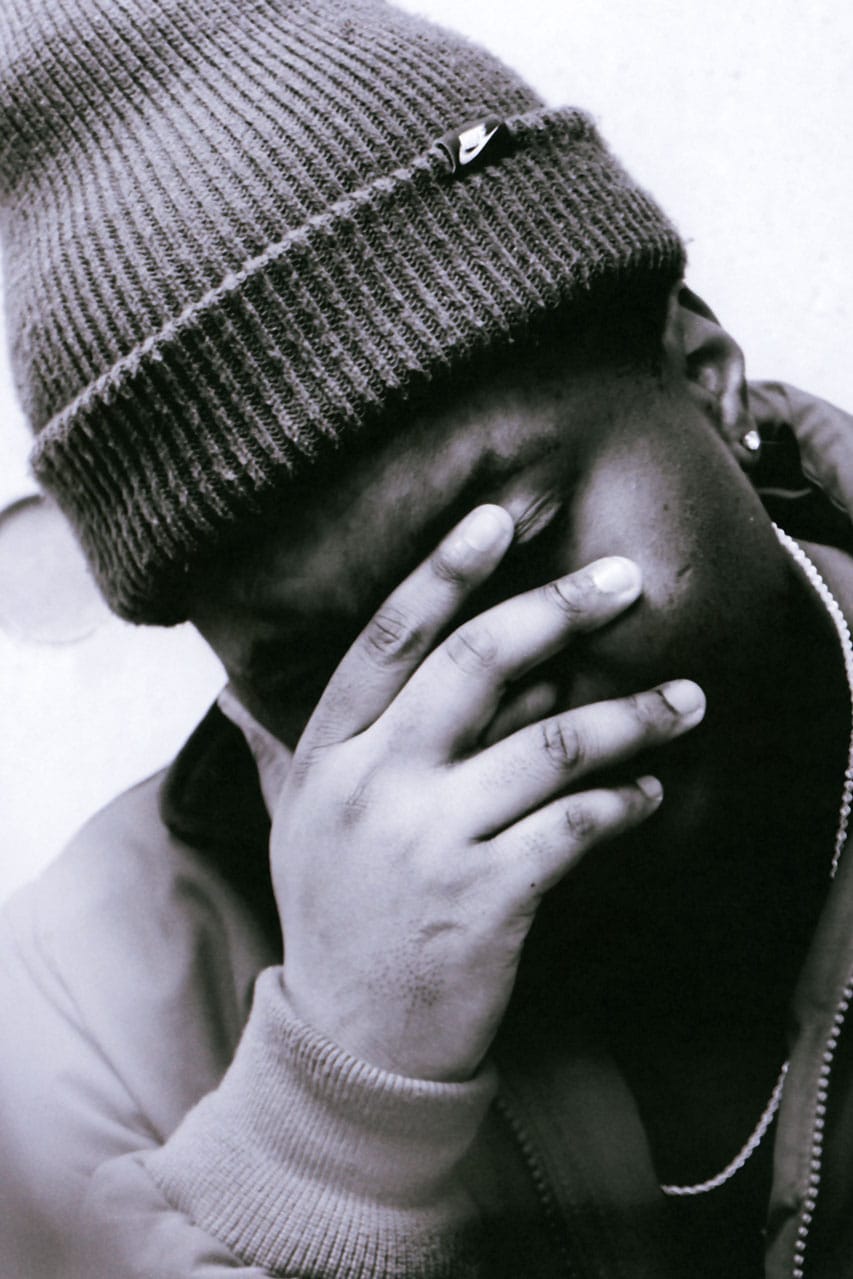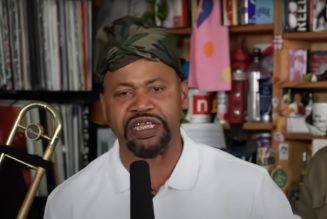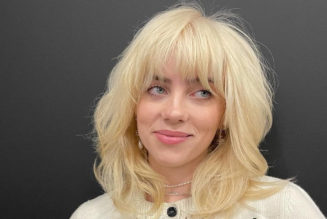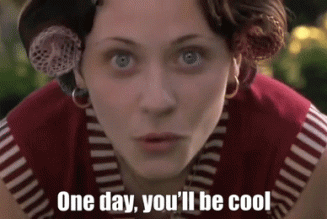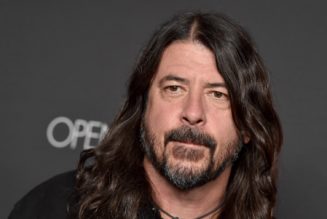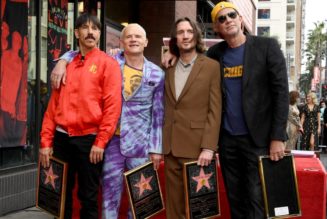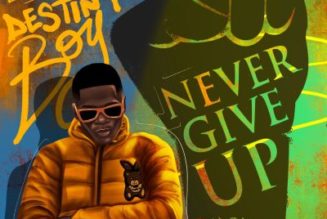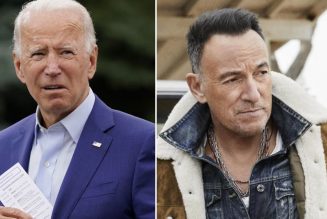“I know that I can’t leave my fate to an algorithm.” This is what Tottenham-raised rapper, Jordy, says when asked about the importance of navigating through the ever-more-saturated UK rap scene of today.
Jordy is speaking to Hypebeast in central London, having just wrapped up his HB-exclusive shoot in a nearby music studio. Easing his way into the interview, he can’t help but laugh about random nights out in Manchester and his enjoyment of heading up north, while joking about accent differences… and the even bigger gap in drink prices.
Jordy’s infectious personality is seen most on YouTube, displaying his ball knowledge for the award-winning Filthy Fellas football podcast. The show has become somewhat of a hit over recent years – but while Jordy admits his inclusion in the show started as a “happy accident,” music has always been “Plan A, B, and C.”
“Early doors, a lot of people would think, “We’re not listening to this guy on YouTube, his friends are just bigging him up,” but if you know my friends, they don’t just big things up,” Jordy adds. That sort of cut-throat honesty is what Jordy has thrived on since the release of his debut solo record “Wavy Yute” in 2017 through to his debut EP, SMH in 2021 – the first of a three-letter EP trilogy that was followed up with KMT in 2021 and concluded earlier this month, with the release of SNM.
The trilogy – including the collaborative project, IF I COULDN’T RAP, I WOULDN’T RAP made with his cousin, Elt Cheekz – saw Jordy receive flowers from critics and fans in abundance, quickly rubbishing the internet trolls that suggest “content creators” can’t make music.
But as often stated, music always comes first for Jordy. His pen game is often straight to the point, with his choppy, one-liner flows regularly veering off into sonics like grime, drill, or even Amapiano. SNM encapsulates Jordy’s adaptability with aplomb. The eight-track EP highlights the fact that Jordy is all grown up, telling stories about his love affairs, family struggles, his record label Flat 10, and more.
Hypebeast caught up with Jordy to discuss his ascension in the game, including his planned talks at a London university, music in his rap collective, Vibbar, and his new collaboration with Jme. Check out the full conversation below.
Hypebeast: Yes Jordy. Music aside, how have you been?
Jordy: Honestly, I’m fine. There’s pressure that comes with being who I am, but I’ve got a good counsel behind me, they’re my support system, and they’re my eyes and ears for lack of a better term. And I’ve got them. I got them to fall back on in the same way they’ve got me to fall back on. So yeah, man. Honestly, I can’t complain.
Your new project, SNM is your most personal EP to date that touches on a lot of private parts of your life. How come you’ve decided to use this project as the time to open up?
I think it’s just growth for me. When I first started rapping, it was a sport that was used to show how good you are at something. But, as I’m getting older, I’ve noticed that it’s a sport to see how true you can say something. So, all that simile stuff, “left back like Evra,” “on the wing like Bale,” all of that was great while we were at university and enjoying our time.
But now I’m pushing closer to 3o and all I want to know is the truth of people. So, I guess all I want to do is tell my truth and whoever relates to it and can live through it, it helps – and I’m grateful for that. These days, I don’t care about rapping all technically and using all the flip-flaps in my words, my content just cuts through, and that’s what I want to do, and that’s what you’re hearing on SNM.
Who were you listening to growing up that inspired you to sharpen your tools as an MC?
I’ve studied everybody. I think that the first person that made me rap was Ludicrous, but back then, I couldn’t understand the lyrics – I just tuned into the videos. But, as I got older, I started to learn about what he was saying. He had a very sick, skippy flow, with presence and he also added his sense of humor to his lyrics.
In the UK, there’s Skepta… Ghetts is sick at putting words together and he’s skippy and all that good stuff. Skepta is also sick at putting words together, and I think they both use words differently in the sense that they use a different amount of words, yet they’re both so direct. Ghetts has a couple of step-overs with his delivery and Skepta just goes – and I think I’ve taken a bit of everything from everyone that I’ve listened to growing up, and that’s what you’re hearing today.
Do you think your ability to be able to control the mic and deliver your lyrics so clearly on the mic allows you to create better music in the studio?
I think clarity is the first thing that you need to get out when you rap. You could be sick and not clear and it doesn’t matter, but the person who is clearer on the mic is always going to be better. This is why I perform my records word for word without performing over my recorded songs when I perform live – you won’t hear it if I’m fighting the recorded version of me.
How was it working with Jme on the latest project, being that he’s such a legend in the UK?
I grew up in Tottenham in the early stages of my life and Jme was the first person that I listened to, loved and saw on the high road. Jme and Skepta were about, I could see the stars they were, and seeing those up close makes you want a bit more of that. I always knew I’d work with Jme, I didn’t know how or when, but I had met him a couple of times, he’s a super easy person to speak to and I couldn’t have hoped for a better track for myself and Jme to spit on.
What was the reasoning behind making the song with Jme so punchy and different, compared to a lot of the songs on SNM?
Well firstly, I made that song a long time before he heard it. Sometimes, you get things across a lot better when you’re not shouting, which is first things first. I think the beat told me what to do with it – and when Jme heard it, he thought that it made sense for him to do it as well. But I love that Jme did it more than me, because what he said was so poignant. You don’t shout the stuff he said, you say it. That’s why I think what he says hits home, so yeah, hats off to him.
“Listen, plan A, B, and C for me is music, Filthy was just a happy accident, where I managed to be friends with a guy called Poet, he has this thing, he happened to have a spare seat and when I sat on it, it turned out to be a hit for me and them.”
Talk to us about the record label, Flat 10, that you and your cousins run.
The label was a happy accident. It’s all of our frustrations balled up into this one concoction and creation. My cousins are older than me and they produced for a long time before I rapped – I tried to produce with them, I was rubbish, so I rapped – and they produced for everyone in the scene you can think of. But, my cousins told me that they wanted to nurture talent and executive produce albums, and I thought what losers! [laughs].
But, as I’m getting older, it makes sense and when I got good enough, I got the call up – they didn’t want to spoon-feed me in the studio. They gave me some pointers, beats, and they sent me out on what I call loan, where I was working with other producers and then I got back with them and they have executively produced every other project that I’ve made.
Flat 10 comes from the name of the house that we all started in. It was flat number 10 in Holloway Road and this is where it all started. Everyone came to that house; Little Simz, Wretch 32, Ghetts, Scorcher, Squeekz, Jacob Banks, George The Poet… Everyone was coming to that house. We’re not in that flat anymore, but the label just signifies where it started and states that we shouldn’t forget where we come from.
One thing that separates you from a lot of other musicians in the UK is your involvement in one of the biggest podcasts in the UK, Filthy Fellas. Do you ever get frustrated when people recognize you from the podcast, and not your music?
I think it’s a blessing and a curse. I’ve managed to iron out the curse side of it, whoever doesn’t know about the music, just doesn’t know. But, early doors, a lot of people would think, “We’re not listening to this guy on YouTube, his friends are just bigging him up,” but if they know my friends, they don’t just big up things.
Listen, plan A, B, and C for me is music, Filthy was just a happy accident, where I managed to be friends with a guy called Poet, he has this thing, he happened to have a spare seat and when I sat on it, it turned out to be a hit for me and them. But yeah, music is the main thing for me – you don’t see me on any other thing, I don’t care, it’s not really my thing.
But, I did have that fight of not wanting to be seen as that, but I have realized that I know who I am, what I am and what I do, and what I’m capable of. Filthy has also helped me sharpen my skills in talking, being on camera… I can’t knock it. It’s helped me, it’s helped my profile.
You’re also involved in the rap collective, Vibbar – how different is the dynamic when it comes to working in a musical group, as opposed to your solo material?
It’s different because it is what it says on the tin. “Vibbar” is a Swedish word for “Vibes,” so the studio sessions are exactly that. It’s all of the boys together, the songs are made by accident, everyone’s smoking, there’s the odd drink here and there, and it’s like a party that just ends up in a song that we package up and sell.
When I’m alone… You hear the stuff I say, it’s not stuff you can say in a party environment. It’s a bit more vulnerable and personal. The workload is a lot less with Vibbar, too… I just take a verse. I don’t mind that either.
How do you manage to balance the creative differences that could come with working in a group?
It’s all conversations and we’ve all learned along the way. Some people have come, people that have gone, fights that have been had, resolved, some unresolved, which is life. But, we’re learning along the way – when something goes wrong, we think about what happened last time and what we can do to resolve it. So, it’s all conversations where everybody needs to put their egos to the side, which is easier said than done. But, for the cause, it’s absolutely necessary.
“We can’t put our fate in the algorithm, AI, and tech’s hands, because it’s dangerous – we don’t know what’s coming tomorrow. I kept getting told to do TikTok’s, now music is being taken off TikTok… So, which one is it?
You’re also a musician who loves to inspire people outside of the creative space, with plans in the works to host talks at a London university?
I got asked by a student, not by the university, which did a lot for me. If an old man asked me to come chat to the kids, I wouldn’t say no, but the fact a young yout asked me… It spells out hunger for me. I’m happy to help anyone that’s coming of age, up and coming, people of color particularly, I’m happy to help with whatever they need. I got help from my cousins growing up, but they were learning along the way while they were teaching me. I’m learning along the way, but I have a lot more tools now because my cousins have taught me.
Do you think there needs to be a stronger infrastructure in universities so kids don’t have to reach out?
Listen, I don’t have to do it. I feel like I do, but I don’t have to. The reason I think it has to be me is because I’ve been that age, I did a music course in college and I dropped out. So, who better to hear it from other than an artist, who’s in the field firsthand? Not to knock anyone who’s not in the field and is teaching, but if I could hear from Wayne Rooney about being a striker… Oh my god! [laughs], I can’t put it any better than that.
How do you manage to keep your core fan base in such a saturated UK rap scene right now?
The first thing I did – which was an accident – was speak to the people that listen to me. I spoke to them, they spoke back and we kept in contact. I’ve got real humans following me and nothing is stopping it. So, the idea of Spotify pushing my new music, it’s really helpful and it’s great, but I know that I can’t leave my fate to an algorithm. I need real people supporting me, that’s why I can sell out a show.
I want to get to a point where I bring physical music out and real humans can buy that… I think we should all be working towards that, we can’t put our fate in the algorithm, AI, and tech’s hands, because it’s dangerous – we don’t know what’s coming tomorrow. I kept getting told to do TikTok’s, now music is being taken off TikTok… So, which one is it? So having humans is one thing I’ve learned along the way.
What is the meaning behind your slogan, If I Couldn’t Rap, I Wouldn’t Rap?
I mean, if I couldn’t rap, I wouldn’t, do you know what I mean? It sounds cringe to say you’re a rapper. Honestly, it’s a bad talking point to a girl… It works, but it’s bad [laughs]. And if you can’t rap you shouldn’t – your friends should tell you, my friends would tell me, they tell me when my music isn’t good and it doesn’t leave the studio.
What’s next for you?
So, I dropped the latest project on the eighth of March, and from the ninth of March onwards, all I’ve had conversations about is the debut album, so I’ve started work on that already. I’ve got two songs that I know are going on it, but for the rest of the year, it’s all about finishing the album. The next thing you hear from me will probably be the album, you won’t hear the letters EP next to my name anymore… The next thing is the album!
